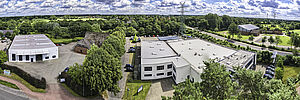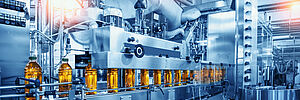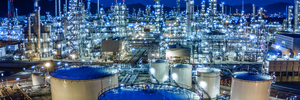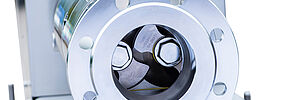Stainless steel pumps
Stainless steel pumps are generally understood to be pumps made of austenitic stainless steels in the groups A2, A4 or higher. The crucial factor here is the components that come into contact with the medium. External components such as bearing supports are often made of different materials, for example grey cast iron.
Stainless steel pumps are designed to ensure that the components are not affected by corrosion without the need for additional coatings such as a paint or varnish finish. This is done by passivating the surfaces. As a result of the effect of oxygen in the atmosphere, or of special passivation media, a layer forms on the surface of stainless steels that shields the base material, producing corrosion resistance against a wide range of media.
There are different resistance levels for stainless steel pumps, depending on the quality of the material. The commonly used term “stainless” is misleading here. Depending on the medium, stainless steel pumps can also be affected by corrosion and become rusty.
Stainless steel pumps are used for a wide range of applications. In the food industry, pumps made of stainless steel are used because of the hygienic requirements in that sector, and the terms food pump and stainless steel pump are often used synonymously in this area. The manufacture of stainless steel pumps is worthy of particular attention. Stainless steel components being compromised by ferritic materials is something that must be avoided. Foreign particles of ferrite embedded in the surface of stainless steels inevitably lead to corrosion. A problem that is mainly visual to begin with can lead to damage in the long term.
For the manufacture of stainless steel pumps, black/white separation is required. Mild steels must be processed separately from stainless steels to ensure that impurities are reliably ruled out. Weld seams must always be re-treated. Untreated cast surfaces made of stainless steel are critical. Despite their differing requirements, cast parts made of stainless steel may sometimes be processed with ferritic blasting material as a result of limited time. These impurities cannot always be removed reliably.
In the food sector, cast surfaces on stainless steel pumps are therefore avoided. Pumps operating in accordance with the most common principles are also available on the market as stainless steel pumps. If the conventional austenitic stainless steels are not sufficient to ensure lasting resistance, higher-quality materials such as duplex, 1.4539 or Hastelloy can be used.
Bronze is a good choice for seawater applications and plastic pumps are available for very aggressive media. Although stainless steel is tough rather than hard, stainless steel pumps can also be used to convey abrasive media. Low flow velocities, such as those found in twin-screw pumps, are important. The crucial components for these applications are also often diffusion-hardened. 1000-1200 HV can be achieved by diffusion hardening without any changes in dimensions and shape and without impairing corrosion resistance.
Diffusion hardening also prevents galling of stainless steel components in the event of unintentional contact during operation. It can be used to replace nickel-based alloys with limited resistance to cleaning agents based on nitric acid.










